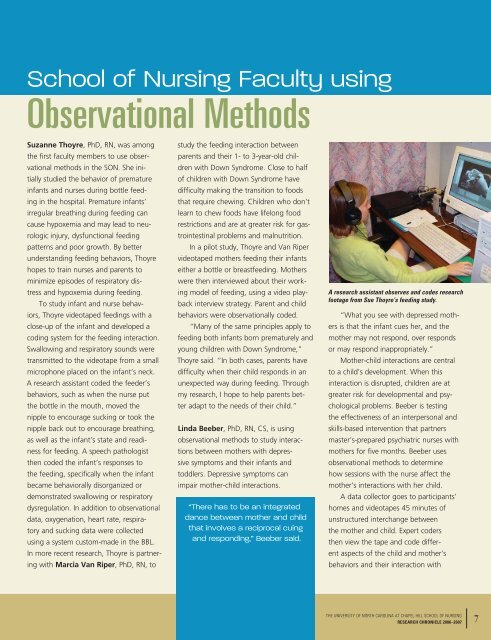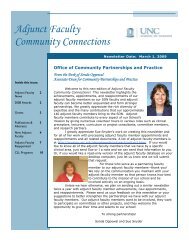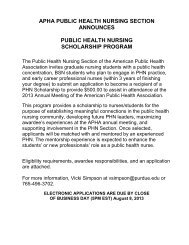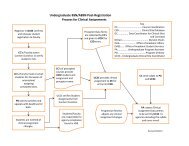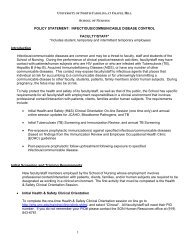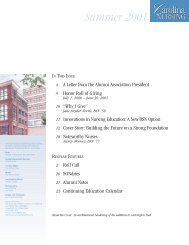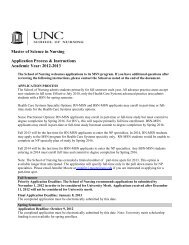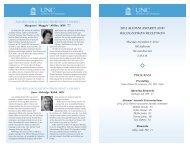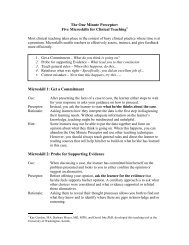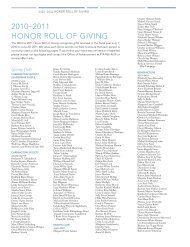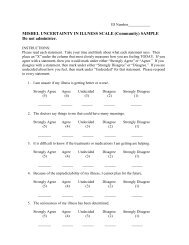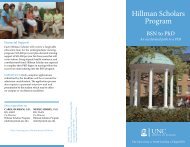Research Chronicle, 2006 - School of Nursing - University of North ...
Research Chronicle, 2006 - School of Nursing - University of North ...
Research Chronicle, 2006 - School of Nursing - University of North ...
You also want an ePaper? Increase the reach of your titles
YUMPU automatically turns print PDFs into web optimized ePapers that Google loves.
<strong>School</strong> <strong>of</strong> <strong>Nursing</strong> Faculty using<br />
Observational Methods<br />
Suzanne Thoyre, PhD, RN, was among<br />
the first faculty members to use observational<br />
methods in the SON. She initially<br />
studied the behavior <strong>of</strong> premature<br />
infants and nurses during bottle feeding<br />
in the hospital. Premature infants’<br />
irregular breathing during feeding can<br />
cause hypoxemia and may lead to neurologic<br />
injury, dysfunctional feeding<br />
patterns and poor growth. By better<br />
understanding feeding behaviors, Thoyre<br />
hopes to train nurses and parents to<br />
minimize episodes <strong>of</strong> respiratory distress<br />
and hypoxemia during feeding.<br />
To study infant and nurse behaviors,<br />
Thoyre videotaped feedings with a<br />
close-up <strong>of</strong> the infant and developed a<br />
coding system for the feeding interaction.<br />
Swallowing and respiratory sounds were<br />
transmitted to the videotape from a small<br />
microphone placed on the infant’s neck.<br />
A research assistant coded the feeder’s<br />
behaviors, such as when the nurse put<br />
the bottle in the mouth, moved the<br />
nipple to encourage sucking or took the<br />
nipple back out to encourage breathing,<br />
as well as the infant’s state and readiness<br />
for feeding. A speech pathologist<br />
then coded the infant’s responses to<br />
the feeding, specifically when the infant<br />
became behaviorally disorganized or<br />
demonstrated swallowing or respiratory<br />
dysregulation. In addition to observational<br />
data, oxygenation, heart rate, respiratory<br />
and sucking data were collected<br />
using a system custom-made in the BBL.<br />
In more recent research, Thoyre is partnering<br />
with Marcia Van Riper, PhD, RN, to<br />
study the feeding interaction between<br />
parents and their 1- to 3-year-old children<br />
with Down Syndrome. Close to half<br />
<strong>of</strong> children with Down Syndrome have<br />
difficulty making the transition to foods<br />
that require chewing. Children who don’t<br />
learn to chew foods have lifelong food<br />
restrictions and are at greater risk for gastrointestinal<br />
problems and malnutrition.<br />
In a pilot study, Thoyre and Van Riper<br />
videotaped mothers feeding their infants<br />
either a bottle or breastfeeding. Mothers<br />
were then interviewed about their working<br />
model <strong>of</strong> feeding, using a video playback<br />
interview strategy. Parent and child<br />
behaviors were observationally coded.<br />
“Many <strong>of</strong> the same principles apply to<br />
feeding both infants born prematurely and<br />
young children with Down Syndrome,”<br />
Thoyre said. “In both cases, parents have<br />
difficulty when their child responds in an<br />
unexpected way during feeding. Through<br />
my research, I hope to help parents better<br />
adapt to the needs <strong>of</strong> their child.”<br />
Linda Beeber, PhD, RN, CS, is using<br />
observational methods to study interactions<br />
between mothers with depressive<br />
symptoms and their infants and<br />
toddlers. Depressive symptoms can<br />
impair mother-child interactions.<br />
“There has to be an integrated<br />
dance between mother and child<br />
that involves a reciprocal cuing<br />
and responding,” Beeber said.<br />
A research assistant observes and codes research<br />
footage from Sue Thoyre’s feeding study.<br />
“What you see with depressed mothers<br />
is that the infant cues her, and the<br />
mother may not respond, over responds<br />
or may respond inappropriately.”<br />
Mother-child interactions are central<br />
to a child’s development. When this<br />
interaction is disrupted, children are at<br />
greater risk for developmental and psychological<br />
problems. Beeber is testing<br />
the effectiveness <strong>of</strong> an interpersonal and<br />
skills-based intervention that partners<br />
master’s-prepared psychiatric nurses with<br />
mothers for five months. Beeber uses<br />
observational methods to determine<br />
how sessions with the nurse affect the<br />
mother’s interactions with her child.<br />
A data collector goes to participants’<br />
homes and videotapes 45 minutes <strong>of</strong><br />
unstructured interchange between<br />
the mother and child. Expert coders<br />
then view the tape and code different<br />
aspects <strong>of</strong> the child and mother’s<br />
behaviors and their interaction with<br />
THE UNIVERSITY OF NORTH CAROLINA AT CHAPEL HILL SCHOOL OF NURSING<br />
RESEARCH CHRONICLE <strong>2006</strong>–2007<br />
7


